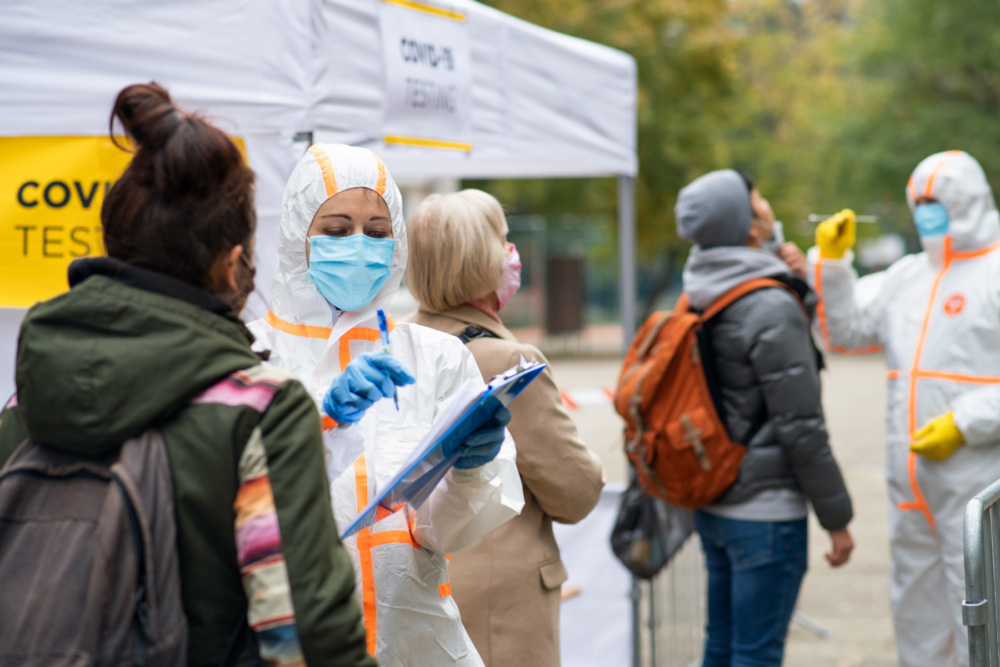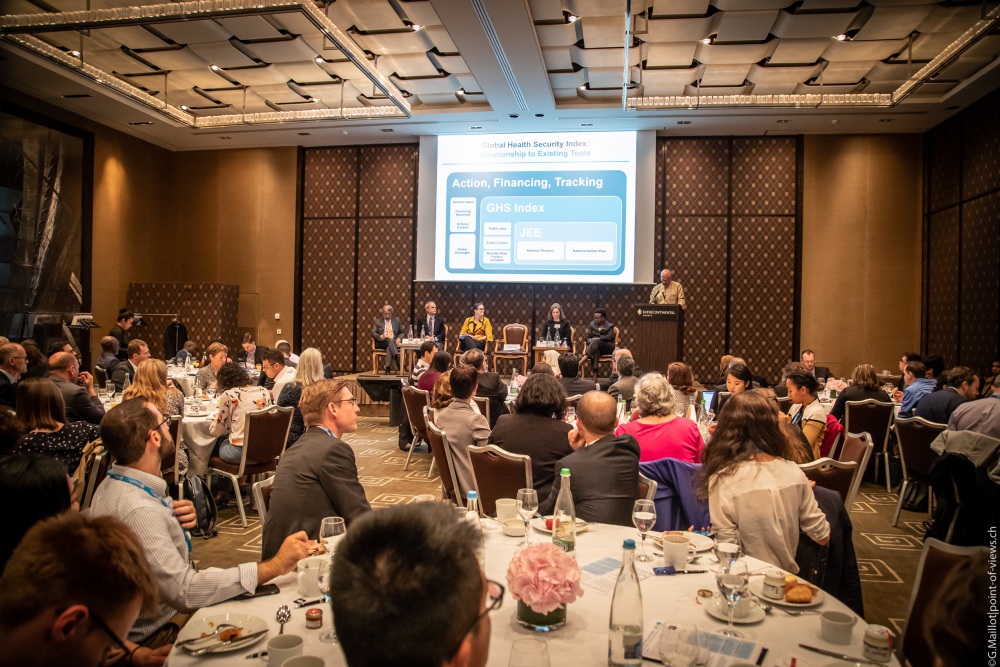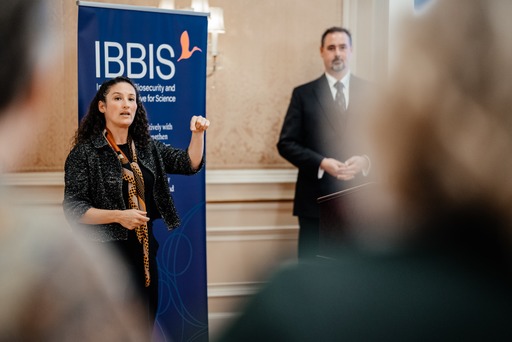
New Study Shows Robust Pandemic Preparedness Strongly Linked to Lower COVID-19 Mortality Rates
New study published in BMJ Global Health finds the pandemic was less deadly in countries that rank high on the Global Health Security Index.
Thanks to a generous new grant of $3.56 million from the Open Philanthropy Project, the Nuclear Threat Initiative biosecurity program (NTI | bio), in collaboration with the Johns Hopkins Center for Health Security (JHU CHS) and The Economist Intelligence Unit (EIU), will create a Global Health Security (GHS) Index. The GHS Index will serve as a national-level assessment of all countries’ capabilities to prevent, detect, and respond to high consequence biological events. This effort will draw on publicly available information, be measured by an independent, non-governmental entity, and be informed by a global panel of experts. The Bill & Melinda Gates Foundation previously provided NTI with a grant of $250,000 toward this effort.
The GHS Index began as a pilot project that had two objectives: first, to develop a framework through which countries would be assessed and second, to test the framework with selected countries. A team of international experts from 12 countries helped build the assessment framework, which included lessons from recent outbreaks, including the 2014-2016 Ebola epidemic in West Africa.
The framework, which will be used for the full GHS Index, includes indicators that take into consideration political and socio-economic risk factors and a country’s broader healthcare system, as well as individual country capability to prevent, detect, and respond to infectious disease threats. The GHS Index framework also draws from internationally-accepted technical assessments, including the World Health Organization International Health Regulations Joint External Evaluation and the World Organization of Animal Health Performance of Veterinary Services Pathway. Development of the GHS Index framework was made possible through support from the Open Philanthropy Project and the Robertson Foundation.
NTI anticipates that a regularly produced and transparent GHS Index of all countries will accomplish multiple goals: create accountability for health security investments, recognize countries that have taken concrete actions to improve capacity, and serve as a tool for country governments, development banks, and donors to systematically prioritize financing to fill vital gaps. The first GHS Index is expected to be released in 2019.
“We deeply appreciate the continuing, generous support from the Open Philanthropy Project to launch a Global Health Security Index comprised of publicly available data for countries around the world,” said NTI Co-Chair and CEO Ernest J. Moniz. “This independent assessment will help keep biological threats at the top of the international security agenda and further prioritize investments to reduce global catastrophic biological risks.”
NTI Co-Chair Sam Nunn echoed these sentiments, emphasizing the value of a sustained index, such as the NTI Nuclear Security Index, which will publish its fourth edition this fall. “We are deeply grateful for the opportunity to launch a full GHS Index,” said Nunn. “We believe that this index will increase awareness globally and create public accountability for improving health security.”
The project leads for the GHS Index effort will be Dr. Elizabeth Cameron, NTI’s Vice President for Global Biological Policy and Programs; Dr. Jennifer Nuzzo, Senior Scholar at JHU CHS; and Leo Abruzzese, Senior Global Director of Public Policy for EIU.
“An unending string of high-consequence disease outbreaks—from Ebola and Nipah to Zika and MERS—have highlighted the critical need for tools to bolster countries’ efforts to build their health security capacities,” said Nuzzo. “Among its myriad benefits, the Index will bring focus to the important link between strong, robust health systems and public health priorities for epidemic preparedness—a connection vital to overall community resilience in disasters.”
The Open Philanthropy Project identifies outstanding giving opportunities, awards grants, tracks the results, and publishes the findings. Its mission is to give effectively and share findings openly so that others may build on them. One of the Project’s focus areas is global catastrophic risks including biosecurity and pandemic preparedness.
The Johns Hopkins Center for Health Security works to protect people from epidemics and disasters and build resilient communities through innovative scholarship, engagement, and research that strengthens the organizations, systems, policies, and programs essential to preventing and responding to public health crises. The Center is part of the Johns Hopkins Bloomberg School of Public Health and is located in Baltimore, MD.
The Economist Intelligence Unit (EIU) is the research arm of The Economist Group, publisher of The Economist. Through a global network of more than 900 economists, analysts and contributors, EIU continuously assesses and forecasts political, economic, policy and business conditions in 205 countries. EIU has an extensive global presence, with 40 Economist Group offices around the world and more than a dozen staffed with EIU analysts and consultants. Through its Public Policy practice, EIU provides timely, reliable, and impartial analysis to governments, institutions, NGOs, and corporations, and is a specialist in performance benchmarking, having developed indices in fields ranging from health to food security to financial inclusion.
NTI works to protect our lives, environment, and quality of life now and for future generations. We work to prevent catastrophic attacks with weapons of mass destruction and disruption (WMDD)—nuclear, biological, radiological, chemical, and cyber. Founded in 2001 by former U.S. Senator Sam Nunn and philanthropist Ted Turner who continue to serve as co-chairs, NTI is guided by a prestigious, international board of directors. Ernest J. Moniz serves as co-chair and chief executive officer; Des Browne is vice chair; and Joan Rohlfing serves as president.
More about NTI’s biosecurity program can be found at www.nti.org/bio.
Media Contact: Cathy Gwin, 202-454-7706, [email protected]
###
Sign up for our newsletter to get the latest on nuclear and biological threats.
New study published in BMJ Global Health finds the pandemic was less deadly in countries that rank high on the Global Health Security Index.
NTI experts briefed government representatives at a G7 working group meeting in Berlin.
The World Bank launches a new fund to support pandemic prevention, preparedness, and response.


